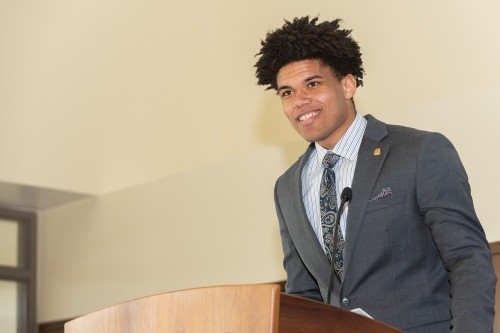Philosophy Major Opens Many Doors
In almost any career scenario, philosophy majors at Stonehill have the opportunity to tailor their research and learning in ways that give them a competitive advantage in the marketplace.
Philosophy Degree Gives Graduates Skills Organizations Value
When Michael Binck ’20 applied for an internship at PricewaterhouseCoopers (PwC) he checked all the boxes you’d expect from a good candidate — and one that you wouldn’t expect. Like others, he was well prepared, well dressed, fully engaged and confident. But in a sea of business majors, one thing stood out about Binck: his philosophy major.
“As part of my thesis, I’m arguing for the ethical use of artificial intelligence in business,” said Binck, whose second major is accounting. “My interest in this topic helped my supervisors see that I’d be able to tackle the company’s work from a different angle than other candidates could.”
The Shelton, Connecticut, resident says he hopes to find work as a technology advisor at a firm like PwC after graduating from Stonehill. And he fully expects to draw on both his majors.
“I want to help companies decide how to implement various technologies,” he said. “As part of this work, I have to be able to craft solid arguments and distill complex information into something digestible. I’ve learned how to do that as a philosophy student. The underlying skills this major teaches are priceless.”
A New Way of Thinking
Through curricula that explore the history and principles of philosophy, students are prepared for careers or graduate study in virtually any field — from business and law to education and social service. Stonehill’s philosophy program seeks to help students examine the human experience, while also teaching them how to write persuasively, devise creative solutions to complex problems, and process information critically and objectively.
“We aren’t just teaching students content, but also a way of thinking. The broad skills they learn are flexible enough to be employed in many different domains,” said Professor Brendan O’Sullivan, philosophy department chair.
Fostering Leadership and Advocacy
As a result, graduates of the program have found employment in prominent organizations that include Boston Children’s Hospital, Liberty Mutual and the Massachusetts Office of the Attorney General. They have also been accepted to a number of highly competitive graduate programs at institutions such as Boston College, Boston University and University of Connecticut.
Nicholas Sangiovanni ’18 is a perfect example. He double-majored in philosophy and English at Stonehill and is now a second-year student at Boston University School of Law.
Nicholas Sangiovanni ’18, Boston University School of Law
“My philosophy courses taught me how to critically analyze dense texts,” said the Smithfield, Rhode Island, native. “Focusing on the minutiae of language is important in the legal profession. The outcome of a case can turn on the placement of a comma in a document.”
Sangiovanni believes his experience as a philosophy major, particularly his time conducting research on the philosophy of race with Professor Megan Mitchell, has helped him become an advocate for others in his work.
“My work with Professor Mitchell highlighted the realities and privileges of my life,” he said. “I’ve carried those lessons with me as I’ve started working on research at BU’s School of Law. I couldn’t do this work as well if I hadn’t had certain experiences in the philosophy department at Stonehill.”
Shelby Ferry ’19, who double-majored in philosophy and environmental studies, is also now pursuing work directly impacting others. She is currently completing a fellowship at Dismas Family Farm in Oakham, Massachusetts. Many participants in the farm’s recovery program have previously been incarcerated. They also struggle with substance abuse and mental health issues.
Ferry is responsible for overseeing farm and household chores, and ensuring that residents are acting in accordance with the program’s standards. She said her philosophy degree prepared her for this challenging yet rewarding work.
“Our residents have had different life experiences than I have,” she said. “My job involves listening to them, putting myself in their shoes, understanding their perspectives, and making logical decisions based on that. The classes I took as a philosophy major have enabled me to perform this work.”
Related Stories
-

Pierrce Holmes ’19 was accepted at a dozen of the most renowned law schools in the nation, chosen by his classmates to be the student speaker at commencement and honored as senior of the year by faculty in his two majors, philosophy and communication…
-

A professor and student had never formally co-led a Stonehill course when Anna Lännström, professor and chair of the Philosophy Department, and Rachel Santos ’17 spoke about the possibility last year. Yet the lack of precedent didn’t strike either of…

